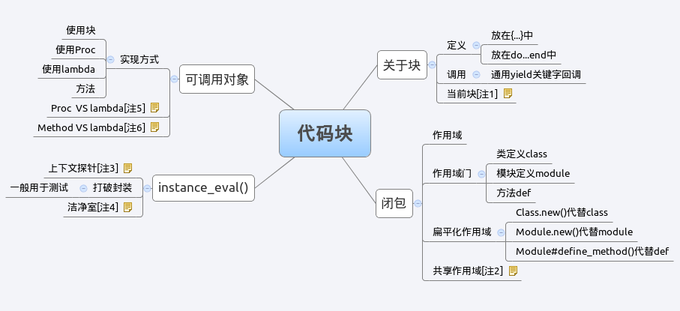块继承自“函数式编程语言 (functional programming languages)”的世界。

注 1: 在一个方法中,可以向 Ruby 询问当前的方法调用是否包含块。这可以通 过 Kernel#block_given?() 方法来做到。
注 2: 如果在一个扁平作用域中定义了多个方法,这这些方法可以用一个作用 域们进行保护,并共享绑定,这种技术称为共享作用域。
-
注 3: 传递给 instance_eval() 方法的块称为一个上下文探针,因为它就像是一 个深入到对象中的代码片段,对其操作。
class C def initialize @x="a private instance variable" end end
obj=C.new obj.instance_eval(@x) #=>"a private instance variable"
* 注4: 有时,你会创建一个对象,仅仅是为了在其中执行块。这样的对象称为洁净室。洁净室仅仅是一个用来执行块的环境,它通常还会暴露若干有用的方法供块调用。
``` ruby
class CleanRoom
def a_useful_method(x);x*2;end
end
CleanRoom.new.instance_eval{a_useful_method(3)} #=>6
注 5: 1.return 方式不同。lambda 从可调用对象中返回,而 proc 从原始上下文中返回。 2.参数检查方式不同。如果 lambda 的产生数量不对,这它会失败,同时抛出一个 ArgumentError 错误;而 proc 则会自动调整传递进来的参数,通过忽略多余的参 数以及为未赋值参数置 nil。
注 6: Method 对象类似于 lambda,但是有一个重要的区别:lambda 在它的作用域中执行 (它是一个闭包),而 Method 对象会在它自身所在对象的作用域中执行。
块知识补充 块是 Ruby 中的一等公民,本质上,它只是一段代码,相当于一个匿名函数。 可以说,块是 Ruby 中最酷、最有用的特性之一。块可以消除重复和临时变量,使代码更加简洁和紧凑,从而更易阅读和维护。块特性整理如下: 1.提高代码简洁性
# 枚举一行搞定
[1, 2, 3].each {|i| puts i}
结果:
1
2
3
2.消除重复,发挥类似回调的作用
def callBlock
yield
yield
end
callBlock {puts "It is a block"}
结果:
It is a block
It is a block
3.迭代
"This is a string".instance_eval do
"HaHa, easy to reverse => #{reverse}."
end
4.简化资源操作
File.open(filename) do |file|
do someting with file
end
# 文件自动关闭,无需手动执行
5.块中本地变量 (从 1.9 开始,;开头)
x = 'outer'
2.times do |;x|
x = 'inner'
puts x
end
结果:
inner
inner
不足之处,欢迎指正补充^_^